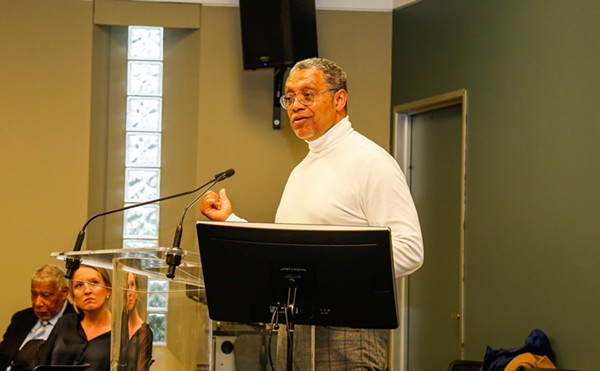Back on Sunset Boulevard in Lorain, far from the nonsense story that a young man named William Avery Jr. would eventually make up and reiterate over and over again to police, a woman and a man were being beaten to death.
Now reformed and following the path of God, Avery has since said that he doesn't know why either of them were killed. He's said his father was the one behind all of it: the murders, the story, the conviction. Nevertheless, once hatched, Avery could never get out from under the weight of this tale. Time began moving fast, and his story took on reality as it bore toward the courtroom.
***
William MacArther Avery Jr. was 14 when he smoked crack for the first time. His father had recently lost his job and "messed up the money," as Avery said. When the child came from school to grab some food, his father told him to light up.
"It'll take your hunger away," he said.
Drugs and lies formed a fundamental culture for the elder Avery on Sunset Boulevard. When shit got out of hand in 1991 and two bodies turned up tortured and bloodied and dead, he thought fast and put his son up to the task of fronting a firsthand story to the cops.
His father was present during the interrogations with Detective Gino Taliano and others in late 1991. He leaned in occasionally to remind Avery of certain memories - nudge, nudge.
As the police department's wheels were greased over time with the information spewing from the elder Avery's smoke-infused den, four men's path toward prison became illuminated. The department's addled mole had his channel into the eyes and ears of city stakeholders. When he needed a scapegoat, Cleveland's dealings around town would fall perfectly in his sight-lines.
This is one way in which wrongful convictions are born: falsified testimony that gets handily passed into public record. It's a simple matter, if one can stomach it. From the initial story he told police to repeated interactions with courts over the next decade-plus, though, Avery would try to back out of it. He would try - sometimes half-heartedly, sometimes sacrificially - to get out of the way of the growing injustice.
For his thorough finger-pointing and involvement with the subsequent trials, however, the young man received $2,000 from Crime Stoppers, $2,000 for later relocation and $1,000 for his eventual deposition. This all unfolded in the years following the murder - a slow, steadily financed construction of fate.
Avery would go on to push the prosecutor, Jonathan Rosenbaum, for $10,000. When Rosenbaum laughed in his face, Avery refused to cooperate. He was tossed in jail for contempt, and, when he got out, a mistrial was called and Avery was once again jailed for perjury.
"If they don't go down for it, you're going down for it," Avery recalls Rosenbaum telling him.
As Rosenbaum and Lorain police officers went on to prepare him for the retrial and seemingly inevitable conviction, Avery noticed that he was being helped along from several directions. He spoke with Chicago-based private investigator Paul Ciolino years later about the truth of what was happening in those interviews:
Ciolino: Now, William, during the times, all the conversations you had with the police officers, the investigating detectives, were they aware of the fact that you weren't there, or did they have to give you information to help you with your story?
Avery: Well, I felt that that's what they was doing. They had pictures out on the counter, showing me how the house was, how the mattress was turned, how the table was flipped, you know. They'll ask me a question about, you know, he would sit in front of me and ask me about, How was the table flipped, you know, and have the picture right there.
Ciolino: So all you had to do was look at the picture so you could answer the question?
Avery: Right.
After the trials and the rounds of testimony, Avery and his father were put into the witness protection program and hustled from motel to motel.
All the while, the elder Avery would go out at night in search of crack and the sweet release of the smoke. He'd take the meal money they had been given as a relocation stipend and spend it on rock. And when it came time for breakfast or lunch or dinner, he'd pass the pipe to his son.












